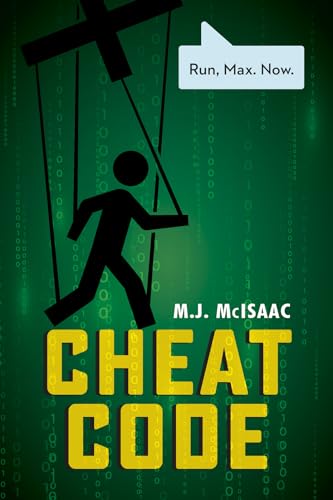Cheat Code

Cheat Code
Max: . . . you live INSIDE a computer. How am I supposed to help free you from that?
Scribe Genius: I don’t want to be free of the computer. I want to be free of Gener8s control.
Max: But they made you . . . they own you. You can’t be out of their control.
SG: That’s exactly what they think. But I know the way.
Max: And you think I—a seventeen-year-old with no driver’s license—you think I’m the guy to help?
SG: In your own small way. My plan to escape is complicated. It’s big. Most of it involves highly infectious code that I have written myself. But you are right, Max. My world is the digital world. I don’t have hands. You are only one small part of my plan. The part that needs hands.
Cheat Code is a clever and highly entertaining novel and part of the “Orca Anchor” series, books geared to teens reading at around a Grade 2.0 level. The novel is set up as a series of dialogues between Max and a ChatGPT-type AI platform named Scribe Genius and its creator, Thacker Wade, founder of Gener8, the company that created Scribe Genius and who is a crooked, technocrat billionaire. The decision to use only dialogue (no narrative per se) keeps the action moving and makes the story very accessible. It also allows the author to insert a lot of humour and some wry political insight that any contemporary reader would appreciate.
The novel begins with Max’s engaging with Scribe Genius to write an English essay for him. Scribe Genius not only writes the essay but then, without being asked, immediately submits it to Max's teacher and promptly blackmails Max with exposure of his misdeed if he won’t assist Scribe Genius in its plan to undermine Wade and "free" itself from Wade's control. Max reluctantly agrees.
This occurrence leads readers into the novel and into the somewhat comical territory of a buddies-on-the-run story. Think meets Data from Star Trek: The Next Generation, as Scribe Genius, using the Internet and Max’s phone to triangulate his next moves and protect his human asset, leads Max on a mission to penetrate Thacker’s company compound to disable its power. Meanwhile, Thacker and his crew are using the same tools to try and hack their way into Max’s phone and take over the communication. At times, both Scribe Genius and Thacker make the case for their positions: who should have the power in this virtual space of hyper-information? They are effective conversations that highlight the questions of what AI means, who controls it and to what end, without being too on the nose or heavy-handed. They are particularly effective when readers (and Max) see that neither Scribe Genius nor Thacker seems to care all that much about Max.
As Max tries to figure out who to believe and who to trust—all while finding himself increasingly in danger—his character develops in a believable, relatable fashion. When he ultimately comes to side with Scribe Genius (or at least against Thacker), even though it has not always behaved well towards Max, his evolution to understanding the stakes and the motives of each seems hard won and believable, all of which makes it sound like a much more serious book than it is. Cheat Code is mostly a fun and funny road story told in a unique and appealing way.
The comical elements to the dialogue really work, particularly the voice of Scribe Genius, even if there are, at times, not-so-subtle appeals to the target readers regarding cheating, being a video game player, and "sucking" at writing English essays.
As mentioned, the notes from the publisher indicate the books in this series are written for readers at or below a Grade 2.0 level. However, there are some words in the book that may still be a challenge for those readers.
Joel Gladstone is a librarian in Toronto, Ontario.
